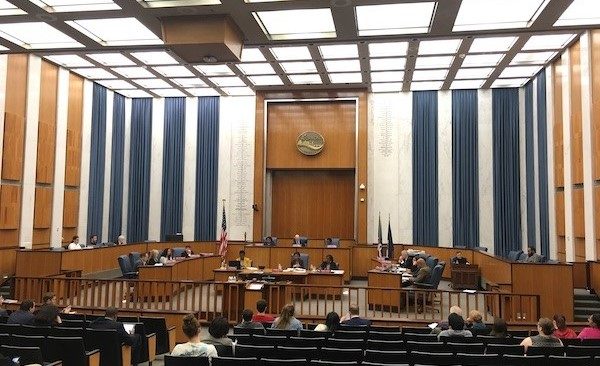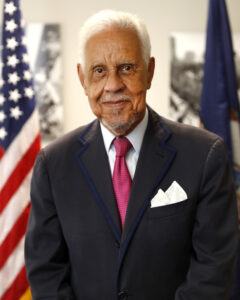Nearly two decades after changing its form of government to the current mayor-council setup, the City of Richmond is mulling potential alterations to its charter that could include a return back to what it had before.
A commission tasked last year by City Council to recommend potential revisions to the 75-year-old charter has completed its review and presented a report that the city released late last week.
The report presents four primary sets of recommendations, including updating the city charter document to give it more clarity; revising the current mayor-council form of government concerning powers and responsibilities of the mayor, council, chief administrative officer and city attorney; and staggering council members’ four-year terms.
The commission also recommends consideration of a change to a council-manager form of government, which Richmond used before it switched to the mayor-council form in 2005. The report stops short of recommending the change, advising instead that it be given consideration in light of a process that would likely involve extensive legal review and a potential advisory referendum put to city voters.
If council desires to pursue that path, the report recommends that it create a new commission or committee specific to the government change by Dec. 15, to allow the time needed for a proposal to come back and a referendum to be held as early as next year and no later than 2026.
The form of government change, which the report states could take full effect by 2029, would reduce the number of seats on council from nine to seven, with the mayor filling one of them and taking part in council business. The city’s magisterial districts would be reduced from nine to six, and the six council members and the mayor would collectively hire a city manager, versus a chief administrative officer, or CAO, appointed by the mayor.
In lieu of such a shift, the commission recommends revisions to the current mayor-council form of government that are aimed at making the mayor a sort of chief executive officer for the city and enhance council’s ability to act as its governing body.
Where the mayor currently hires and fires the CAO, and council hires and fires the city attorney, the commission suggests that both the mayor and council have a say in those positions, considered the top administrative roles for the city.
It also suggests that the mayor be able to appoint and remove department heads, or delegate that to the CAO, and that the mayor provide a monthly public update to council and take questions from each member. Higher compensation for the mayor and council members also is advised.
The report recommends pushing forward those revisions in January so that the so-called mayor-council “partnership model” could take effect in 2025.
Also recommended is a staggering of terms among council members, who currently are elected on the same four-year cycle, and textual updates to the city charter document aimed at making it more legible and reducing potential for confusion or disputes. The document changes would be presented to the 2024 General Assembly, while the staggered terms could be implemented by 2028.
The nine-member commission was appointed last year after council first requested it in late 2021. The request, patroned by Cynthia Newbille, Ellen Robertson and Ann-Frances Lambert, noted numerous amendments that had been made to the charter over the years and the 2005 change to the mayor-council form, which the request described as “unique among the Commonwealth of Virginia’s cities.” A previous charter review commission was formed in 2008.
The current commission’s report states: “The Commission’s aim is to consider how best to implement democratic self-government in the City of Richmond under the City’s current conditions, taking account of both the city’s experience with the current form of government and the numerous changes that have taken place in Richmond from 2004 to the present.”
The General Assembly enacted the current government form for Richmond in 2004 after a citywide referendum in 2003, when, the report states, voters overwhelmingly approved proposals from a private group led by former Richmond Mayor Thomas Bliley and former Virginia Gov. L. Douglas Wilder.
The change, which took effect in 2005, established a directly elected mayor instead of one appointed by council. The mayor is elected by winning five of the city’s nine council districts – an electoral system the report calls “unique” and “designed to protect Black voting power.”
It also established the mayor-council government, in which the mayor acts as CEO by hiring a CAO to run the city’s day-to-day operations. The report states that Richmond’s specific form of government “was and remains unique within Virginia, although numerous cities nationally have similar structural arrangements.”
The first mayor elected under the new system was Wilder, who served one four-year term from 2005 to 2009. The report states that Wilder “regularly called for revisions to the charter with the aim of expanding the formal powers of the mayor,” resulting in several conflicts within City Hall that produced two lawsuits.
In an interview with BizSense in June, Wilder – now a distinguished professor and namesake of Virginia Commonwealth University’s L. Douglas Wilder School of Government and Public Affairs – said he would be opposed to changing Richmond’s government form again.
“One of the reasons we changed the form of government to what it is, what it should have been, was because I concluded that Richmond had become a cesspool of inefficiency and corruption,” Wilder said. “As the old form would require the mayor to be a member of the City Council, he was merely the presiding officer. The City Council would hire a city manager.
“Returning to this form of government, in effect, is saying that the City Council would be running the government because the mayor would be a member of the council. The City Council would hire the manager, and all that the manager would need is a majority vote of the City Council. That’s not what we need,” he said.
“We need someone with experience, with knowledge of government. Right now, the City of Richmond’s school systems rank at the bottom; our crime rates are at the top. Rather than talk about changing the form of government, let’s change some of those people who are in government or in these positions.” Laughing, he added, “I’m 100 percent for that.”
The city’s release said the commission’s recommendations “will be reviewed by Richmond City Council for its consideration and deliberation.” The commission was led by Thad Williamson as chairman and included vice chair Rachael Deane, secretary Antoine Banks, and fellow city residents Bill Echelberger, Kyle Elliott, John Girardi, Travis Gunn, Steven Koski and Daisy Weaver.
The commission’s full report can be viewed here.
The post City charter review commission floats government structure change in report appeared first on Richmond BizSense.


